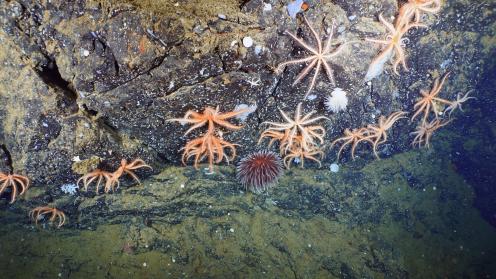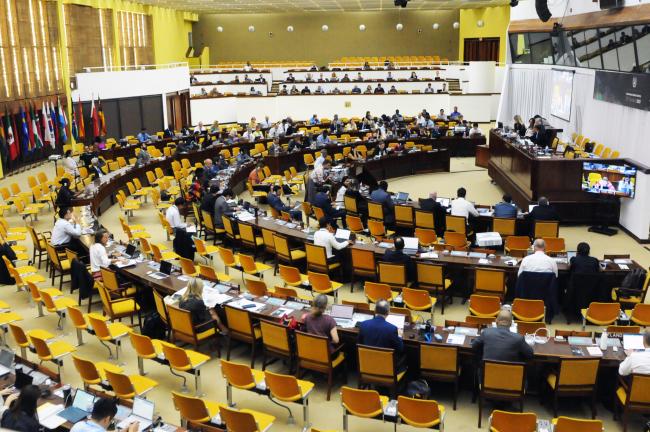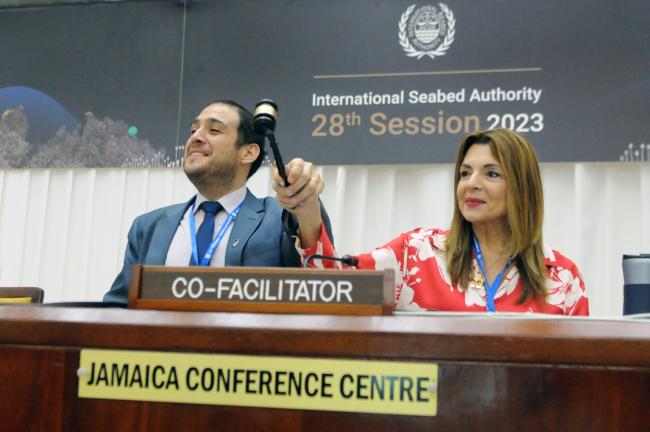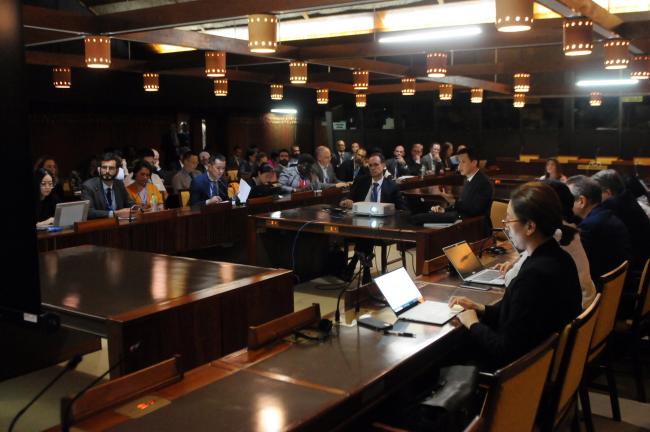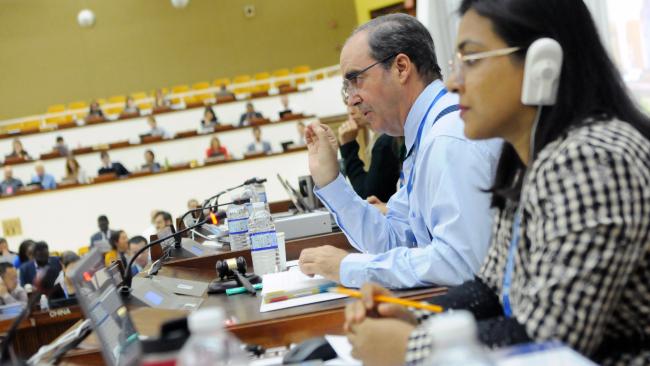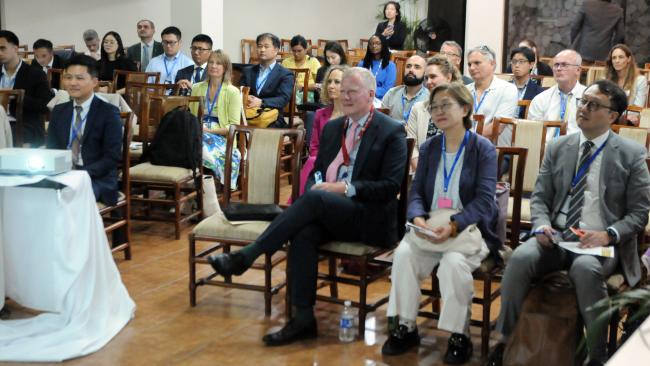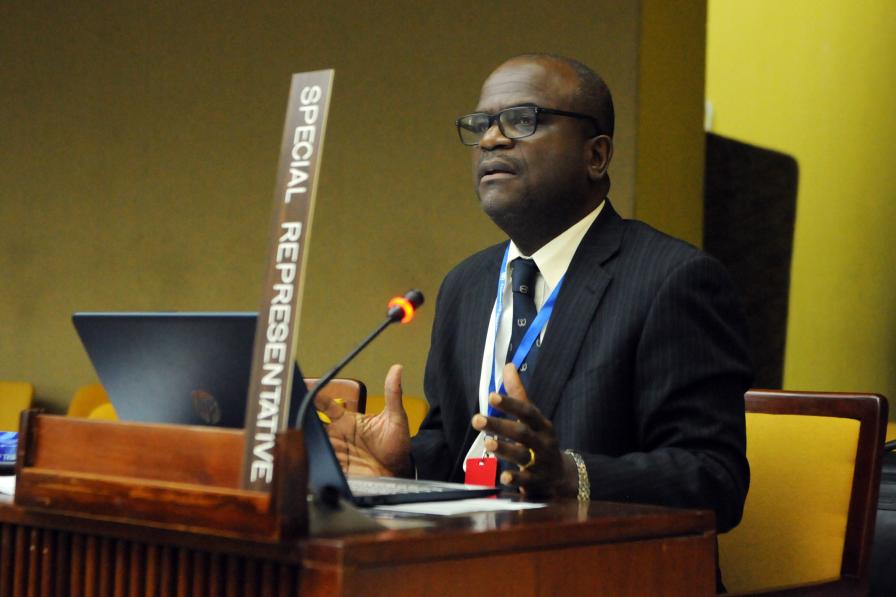On Wednesday, the International Seabed Authority (ISA) Council continued work in an informal working group setting, addressing the section on the consideration of applications for commercial deep-sea mining by the Legal and Technical Commission (LTC) as well as criteria for assessment of applicants. In the afternoon, they started discussing the President’s Text, focusing on the preambular part of the exploitation regulations, obligations of contractors, joint arrangements, and matters relating to production.
In the morning, Georgina Guillén-Grillo (Costa Rica) and Salvador Vega Telias (Chile), Co-Facilitators of the Informal Working Group on institutional matters, invited delegates to resume consideration of general provisions (regulation 12). On a provision describing the principles, policies, and regulations the LTC should comply with while considering a proposed plan of work, opinions converged around simplified language noting the LTC, in considering a proposed plan of work, shall apply the ISA rules, regulations, and procedures in a uniform and non-discriminatory way.
Many supported a self-standing regulation on the LTC’s ability to seek advice from competent independent experts, if required, recognizing the ability of the LTC to seek external expertise is enshrined in the UN Convention on the Law of the Sea (UNCLOS), but expressing the desire to “flesh this out” in the regulations.
On the consideration of the proposed plan of work by the LTC, delegates further discussed:
- if the LTC “shall” or “may” take into account the listed elements;
- inclusion of a reference to consider any advice or reports received from any competent UN organ;
- reference to adjacent coastal states;
- the previous operating record of the applicant and whether to include the previous operating record of the sponsoring state; and
- inclusion of a reference to the Regional Environmental Management Plan (REMP).
On the assessment of applicants (regulation 13), many delegates suggested reordering the regulations, noting the assessment of applicants should come before the assessment of applications. Some delegates suggested streamlining the provision, deleting redundancies addressed in other regulations.
A number of members proposed broadening the stakeholder consultation to address the entire plan of work rather than just the environmental plan. Some delegates and observers drew attention to the need to ensure coordination between a contractor and a submarine cable operator at an early stage.
On environmental protection, a member stressed that the LTC, upon reviewing a plan of work, should address at least five categories of requirements as operational prerequisites:
- those derived from UNCLOS Article 145 (protection of the marine environment);
- general goals and objectives included in relevant regulations;
- goals and measures of the relevant REMP;
- relevant standards, in particular on environmental thresholds; and
- the results of an environmental impact assessment.
He suggested, and Council members agreed to, further intersessional work. Observers suggested considering biocultural and cultural heritage, and the need to define “intense fishing activity.”
Co-Facilitator Guillén thanked delegations, encouraged written comments by 15 September 2023, and closed the working group meeting.
At lunchtime, delegates engaged in an informal dialogue on the two-year rule.
In the afternoon, the Council met in an informal setting, facilitated by Council President Juan José Gonzalez Mijares (México), to discuss the President’s text, which addresses provisions that were not taken up by other working groups.
On the preamble, delegates expressed divergent preferences on two alternative formulations. Many delegates expressed flexibility in finding common ground and supported referring to the principle of the common heritage of “humankind,” with some suggesting “recalling” rather than “reaffirming” the principle. Some delegates suggested reference to the 2030 Agenda for Sustainable Development and the Sustainable Development Goals (SDGs), while others opposed, noting the SDGs are timebound. An observer suggested reference to the recognition of the rights of Indigenous Peoples and the principle of free, prior, and informed consent.
Delegates further discussed:
- the exploitation contract (regulation 17);
- rights and exclusivity under an exploitation contract (regulation 18), with some delegates raising concerns about exploration activities carried out once an exploitation contract is in place, querying if an exploitation contract can include exploration activities;
- contractors’ obligations (regulation 18 bis), with a number of delegates highlighting the need to further address liability issues, and some suggesting deleting a provision related to sponsoring states’ obligations;
- joint arrangements (regulation 19), with a couple of members stressing the need to develop relevant binding standards providing for such joint arrangements;
- term and renewal of exploitation contracts (regulation 20), with members expressing different opinions on the maximum duration of an exploitation contract, and discussing alternative formulations on the renewal of exploitation contracts, including whether the LTC “shall” or “may” recommend such renewal;
- termination of sponsorship (regulation 21), with delegates suggesting a provision for cases where there are two or more sponsoring states and one of them terminates the sponsorship as well as discussing proposed timeframes for termination of sponsorship;
- use of the exploitation contract as security (regulation 22);
- change of control (regulation 24), with a delegation proposing to defer some responsibilities from the Secretary-General to the LTC;
- documents to be submitted prior to production (regulation 25); and
- the environmental performance guarantee (regulation 26), with delegates expressing skepticism over suggested reference to “decommissioning bonds” and one noting the use of environmental performance guarantees should not be restricted to the closure of exploitation activities.
In the evening, a side event hosted by the ISA Secretariat and the Sustainable Seabed Knowledge Initiative focused on “Ways to advance our understanding of biodiversity: From global collaboration to deep-sea conservation.”
All ENB photos are free to use with attribution. For the 2nd Part of the 28th Annual Session of the ISA, please use: Photo by IISD/ENB | Diego Noguera
To receive free coverage of global environmental events delivered to your inbox, subscribe to the ENB Update newsletter.
Informal Working Group on Institutional Matters

(L-R) Lea Kolmos Weis and Mariana Durney, ISA Secretariat; Gina Guillén Grillo, Costa Rica, and Salvador Vega Telias, Chile, Co-Facilitators of the Working Group on institutional matters; and Alyssa Allen, ISA Secretariat

Ekolu Lindsey III, Polaniu Hiu-Maui Nui Makai Networ, and Till Seidensticker, Greenpeace International
